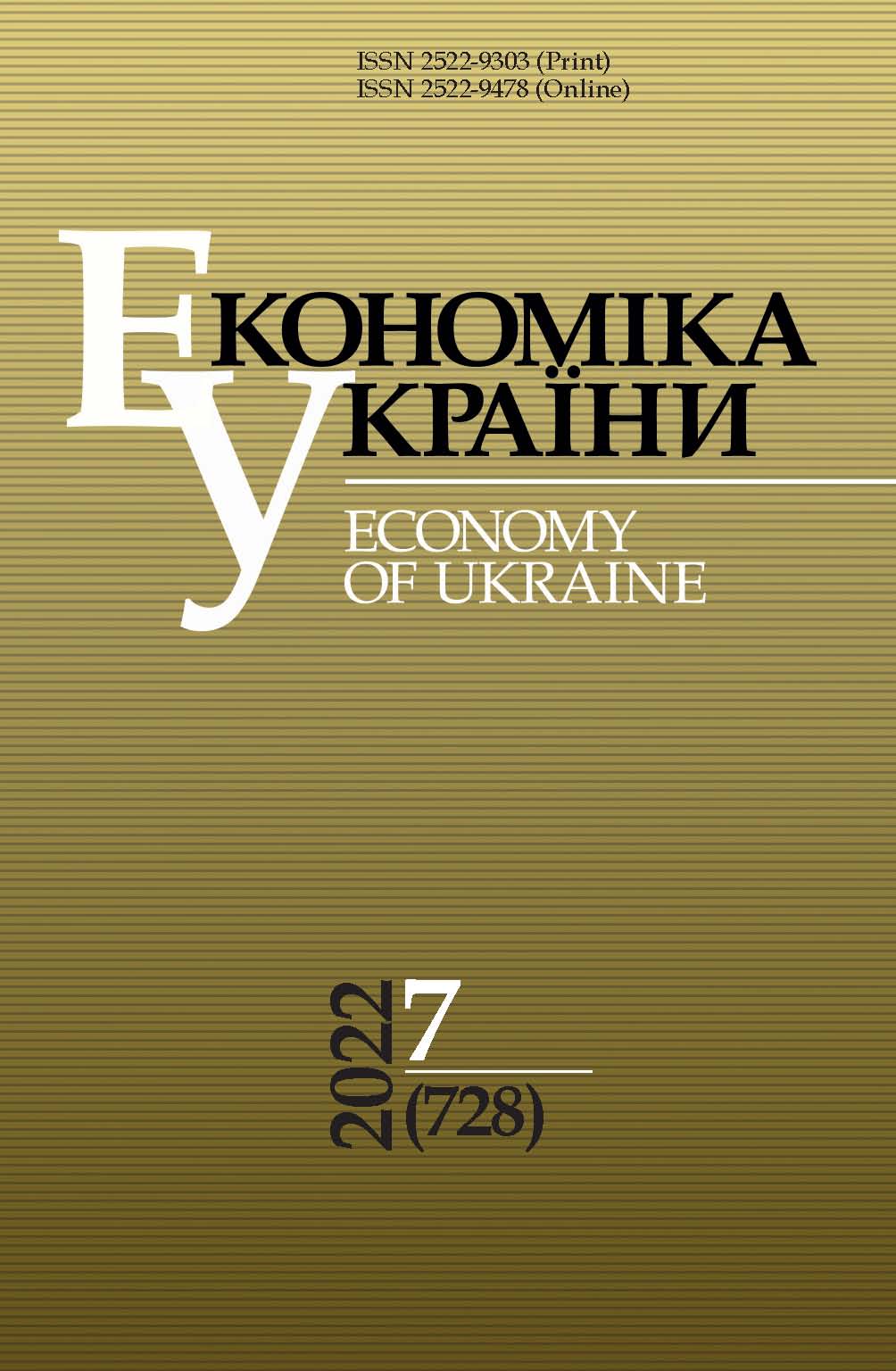ЗАБЕЗПЕЧЕННЯ ПРОДОВОЛЬЧОЇ БЕЗПЕКИ УКРАЇНИ: ПОВОЄННИЙ КОНТЕКСТ
DOI:
https://doi.org/10.15407/economyukr.2022.07.021Ключові слова:
сільгоспвиробництво, агропродовольче споживання, воєнні дії, сталий розвиток, модернізація агровиробництва, структурна перебудова сільського господарства.Анотація
Забезпечення продовольчої безпеки на національному і глобальному рівнях на засадах сталості є одним з пріоритетів аграрної політики України. У довоєнний період вітчизняний агарний сектор гарантував високий рівень продовольчої безпеки нашої держави і суттєво впливав на насиченість глобального продовольчого ринку. Однак триваюча в Україні війна спричинила руйнування у сфері виробництва і збуту агропродовольчої продукції, що негативно позначилося на стані продовольчого ринку. В період воєнних дій значущість проблеми забезпечення національної продовольчої безпеки зростає багаторазово, хоча Україна і має достатньо резервів продовольчої продукції. Війна в Україні суттєво скоротила масштаби сільгоспвиробництва і змінила його структуру, що в найближчому майбутньому позначиться на динаміці агровиробництва і стані національної продовольчої безпеки. Крім того, вона негативно впливає на доходи населення, тому частка витрат на продовольство в сукупних витратах, яка є одним з ключових індикаторів продовольчої безпеки, зростатиме. Це свідчить про необхідність вжиття заходів для підвищення цінової доступності продовольства і внутрішнього продовольчого попиту.
Відновлення й подальше зростання в повоєнний період рівня продовольчого забезпечення населення України, як і розвиток агропродовольчого експорту, вимагатимуть переходу до реалізації довгострокових цілей забезпечення національної продовольчої безпеки шляхом нарощування обсягів і асортименту агропродовольчого виробництва як результату його інноваційної модернізації та структурної трансформації. В основу стратегічного напряму модернізації аграрного сектору необхідно покласти концепцію екологічного ресурсозберігаючого сільського господарства, що забезпечить: збереження і відтворення родючості сільськогосподарських угідь як вирішального чинника продовольчої безпеки в довгостроковій перспективі; покращення якості продуктів харчування для населення; розширення експортного потенціалу агропродовольчої продукції за рахунок високоякісних товарів з вищою доданою вартістю.
Посилання
Kemmerling B., Schetter C., Wirkus L. The logics of war and food (in)security. Global Food Security, 2022, Vol. 33.
Martin-Shields C., Stojetz W. Food security and conflict. Empirical challenges and future opportunities for research and policy making on food security and conflict. FAO Agricultural Development Economics. Working Paper, September 2018, available at: www.fao.org/3/ca1587en/ca1587en.pdf
Caprile A. Russia's war on Ukraine: Impact on food security and EU response. European Parliament, available at: www.europarl.europa.eu/RegData/etudes/ATAG/2022/729367/EPRS_ATA(2022)729367_EN.pdf
Shubravska O.V. Development of agroindustrial production of Ukraine: tasks and challenges. Economy of Agro-Industrial Complex, 2016, No. 4, pp. 5-12 [in Ukrainian].
Herrero M., Thornton P.-K., Mason-D'Croz D. et al. Innovation can accelerate the transition towards a sustainable food system. Natural Food, 2020, Vol. 1, pp. 266-272.
Lang T., Barling D. Food security and food sustainability: reformulating the debate. The Geographical Journal, 2012, Vol. 178(4), pp. 313-326.
Cramon-Taubadel von S. The Russian invasion of Ukraine reminds us that agriculture and agricultural policy have global and geostrategic dimensions. Agrar Debatten, 2022, Mar. 15, available at: agrardebatten.de/agrarzukunft/russias-invasion-of-ukraine-implications-for-grain-markets-and-food-security/ (accessed on: 19.05.2022).
Long J.B. de, Eichengreen B. The Marshall Plan: history's most successful Structural Adjustment Program. NBER working papers series. Working Paper, 1991, November, No. 3899, available at: www.nber.org/system/files/working_papers/w3899/w3899.pdf
Тyabji N. Japanese Miracle: Review Article of Chalmers Johnson MITI and the Japanese Miracle: The Growth of Industrial Policy, 1925-75. Munich Personal RePEc Archive, 1984, April, available at: mpra.ub.uni-muenchen.de/79061/1/MPRA_paper_79061.pdf
Ciulu R. Secrets of the South-Korean Economic Miracle. SSRN, 2009, Oct. 23, available at: papers.ssrn.com/sol3/papers.cfm?abstract_id=1540002 (accessed on: 03.06.2022).
Schein A. The economic consequences of wars in the land of Israel in the last hundred years, 1914-2014. Israel Affairs, 2017, Vol. 23, No. 4, pp. 650-668.
Mc Carthy U., Uysal I., Badia-Melis R. et al. Global food security -- Issues, Challenges and Technological Solutions. Trends in Food Science & Technology, 2018, Vol. 77, No. 7, pp. 11-20, available at: researchrepository.ucd.ie/bitstream/10197/10016/2/Global%20Food%20Security%20Mc%20Carthy%20et%20al%20MANUSCRIPT.pdf
Shubravska O., Prokopenko K. Formation of agro-food specialization of Ukraine in the context of modern investment processes. Economy of Ukraine, 2021, No. 10, pp. 35-51 [in Ukrainian].
Fanzo J., Covic N., Dobermann A. et al. A research vision for food systems in the 2020s: Defying the status quo. Global Food Security, 2020, Vol. 26.
##submission.downloads##
Опубліковано
Як цитувати
Номер
Розділ
Ліцензія
Авторське право (c) 2022 Державна установа "Інститут економіки та прогнозування Національної академії наук України"

Ця робота ліцензується відповідно до Creative Commons Attribution-NonCommercial-NoDerivatives 4.0 International License.



